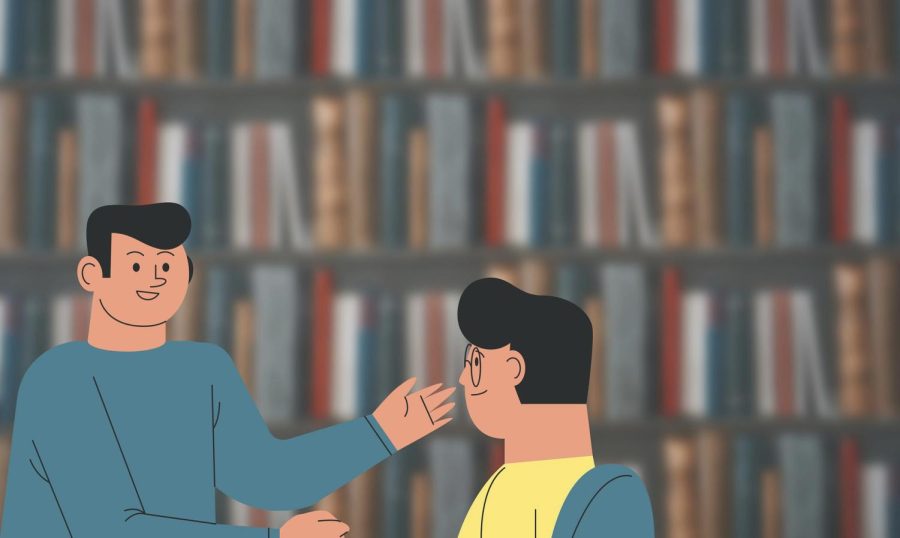Therapy Myths Debunked by a Real Therapist
November 16, 2022
When I asked students what they believed the purpose of going to therapy or seeing a therapist was, a common answer was along the following lines: I think the purpose of therapy is to get to the root of somebody’s mental health problems and find possible solutions. I think someone would see a therapist…when they need help.
Our notions about therapy have come a long way. However, even though more people are aware of its benefits, the persistence of the myths and stigma surrounding therapy still prevent people from getting help.
Since therapy happens behind closed doors, it’s easy for us to believe the myths about therapy when we don’t have personal experience. To learn the truth about therapy, I talked to Pamela Pfefer, who has been a therapist for over 20 years. She shares what therapy is, demystifies therapy, and gives advice regarding the common mental disorder seasonal depression.
Terminology
Therapy (also called psychotherapy): Treatment techniques that aim to help a person identify and change troubling emotions, beliefs, and behavior.
Cognitive Behavioral Therapy (CBT): A treatment with an emphasis on helping individuals develop coping skills so that they learn to be their own therapists and can maintain healthy lifestyle patterns.
Psychologist: A person trained and educated to perform psychological research, testing, and therapy.
Seasonal Affective Disorder (also called seasonal depression): A type of depression that’s triggered by a change in seasons.
Background
What made you want to become a therapist?
PP: It’s what I’ve wanted to do probably since sixth grade. It started because of an after school program where we would volunteer at the Grace Plaza Nursing Center. Then my friends and I volunteered at North Shore University Hospital. And I guess I just always wanted to help people. I always like listening to people; I always like trying to help someone find a solution.
Can you explain what a therapist does?
PP: We do talk therapy, essentially. There are a lot of different ways of going about giving treatment. I’m a big believer in cognitive behavioral therapy (CBT). I believe and I’ve seen that when you’re able to make the thought more positive and the behavior more positive, somebody is much happier. So I use CBT.
Myths About Therapy
Therapy isn’t necessary if you have a close family or friend to talk to.
PP: Sometimes, no matter how close you are with your family or your friends, there are things that you’re just not comfortable talking about. And you want the feedback from somebody who’s not going to say, “don’t worry, you’ll get over it.” When you go to a therapist, you’re looking for concrete ways to make positive changes. We take it a lot more seriously.
Therapy is only for serious problems, or should be someone’s last resort.
PP: I never think you should wait until it’s the last resort because that tells me whatever has been persisting has been going on for an extended period of time. Unfortunately, a lot of people wait until they’re in a crisis, and the problem is it’ll take a little bit longer to get out of the crisis, whereas if you start working on it before the crisis phase, you probably won’t hit the crisis phase. I think [therapy] is for when you start noticing any kind of [persistent] negative change [whether it’s] how you’re thinking about yourself, your behavior, appetite, self-esteem, self-confidence.
Those who need therapy are weak or crazy.
PP: My view on this is [that] it takes an incredible amount of strength to reach out and ask for help. Not asking for help when you know that you need it is what I view as the weakness. Taking control of your mental health is strength. So I have an opposite belief that I think it’s the strong ones who go for help, not the weak ones.
Therapy is a venting session. A therapist only sits and nods along.
PP: First of all, a lot of times while you’re talking in therapy, you start to come to realizations of your own. A therapist may point out a thing like here or there, but how does listening to me talk the whole time help you? We’ll spend time talking about what the problem is, and then possible solutions. So it’s a [venting session] and then what can I do about it? How do I take control?
A therapist will have a solution for all of life’s problems or therapists couldn’t possibly help me with my problems.
PP: Nobody has a solution to everybody’s problems. We may come up with 10 solutions, and maybe one of those will work, maybe 10 of them will work. But when you stop trying to come up with solutions, you’re giving up. You have to keep plugging along at solutions, and when it doesn’t work, you find something else.
That’s also where the therapist helps, [because] we can think of some things outside the box that may not occur to you. But to expect us to have the answers to all your problems—look, we’re human, we have our own problems. Just because I can fix yours doesn’t mean my life’s perfect. We all [are working] towards our mental health.
Therapy is unnecessary if I experience highs and lows.
PP: [In your treatment] it’s important to remember that there are highs. You want to talk about the good things that are happening in your life, because talking about them in therapy [helps you] remember that those highs are attainable again, and it reminds you that not everything is so shitty.
People will think poorly of me if I attend therapy.
PP: I would say, who are these people? How would they know? Everything is confidential [in therapy] so we can’t say anything. It’s your own ego you have to get over.
The real shame about the stigma of therapy is that so much is preventable. So many needless things happen because somebody won’t reach out to get therapy, to take care of their mental health. It’s not enough to just be in control of your schoolwork, your job, your family. If you don’t have your mental health, you can’t really be there for all those other things. And if you do experience them, you’re experiencing them while almost numb. We should put a lot more time and energy into the benefits of getting therapy so you feel more positive, so your outcomes are more positive.
Seasonal Affective Disorder
What advice do you have for people who experience Seasonal Affective Disorder?
PP: Seasonal affective disorder sucks. First of all, stay by natural light, sit by a window if you can, so you’re getting sunlight on you. Go outside during the daytime. But really try to stay active and try to be outside.







